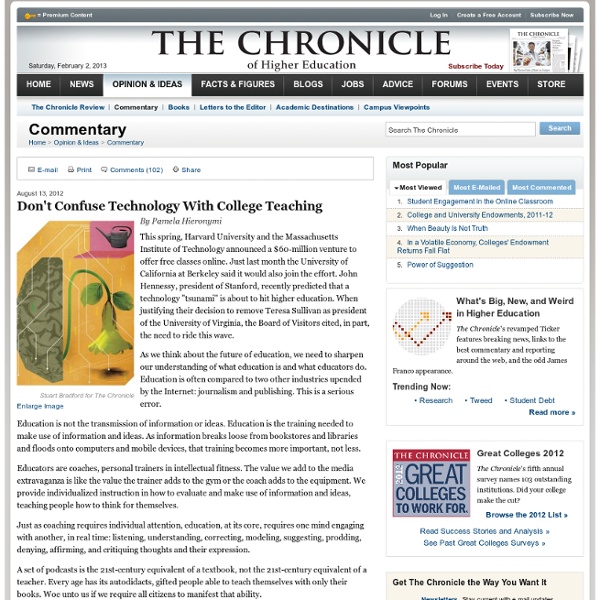Minds on Fire: Open Education, the Long Tail, and Learning 2.0 (EDUCAUSE Review
© 2008 John Seely Brown and Richard P. Adler. Text illustrations © 2008 Susan E. Haviland. EDUCAUSE Review, vol. 43, no. 1 (January/February 2008): 16–32 John Seely Brown and Richard P. John Seely Brown is a Visiting Scholar and Advisor to the Provost at the University of Southern California (USC) and Independent Co-Chairman of a New Deloitte Research Center. Comments on this article can be posted to the web via the link at the bottom of this page. More than one-third of the world’s population is under 20. —Sir John Daniel, 1996 The world has become increasingly “flat,†as Tom Friedman has shown. If access to higher education is a necessary element in expanding economic prosperity and improving the quality of life, then we need to address the problem of the growing global demand for education, as identified by Sir John Daniel.3 Compounding this challenge of demand from college-age students is the fact that the world is changing at an ever-faster pace. Social Learning vs.
Digital Professor Certification - Online Teaching & Learning - Programs - Faculty Development - Valencia Community College
This course will explore the Quality Matters project and processes and will prepare the participant to be part of an initiative that impacts the design of online courses and ultimately, student success. Participants should be experienced online instructors. After successfully completing this course, participants will be eligible to serve on a Valencia Quality Matters peer course review. Note: This course is required for Digital Professor Certification
Communication, Relationships and Care: A Reader - Martin Robb, Sheila Barrett
PROFESSORJOSH.COM
What's Wrong with Job Interviews, and How to Fix Them
About gRSShopper ~ gRSShopper
You are not logged in. [] [] gRSShopper is a personal web environment that combines resource aggregation, a personal dataspace, and personal publishing. It allows you to organize your online content any way you want to, to import content - your own or others' - from remote sites, to remix and repurpose it, and to distribute it as RSS, web pages, JSON data, or RSS feeds. gRSShopper incorporates a number of distinct data types. For example, the gRSShopper harvester will harvest a link from a given feed. Content in gRSShopper is created and manipulated through the use of system code that allows administrators to harvest, map, and display data, as well as to link to and create their own content. gRSShopper is also intended to act as a fully-fledged publishing tool.
EdX: Harvard's New Domain | FM
On May 2, YouTube user “EdXOnline” uploaded a video entitled “edX: The Future of Online Education is Now.” The video, a two and a half minute trailer for the $60 million open source online education platform jointly overseen by Harvard and MIT, hit over 150,000 views within weeks. In the video’s opening statement, L. Rafael Reif, President (then Provost) of MIT describes the project in these terms: “so novel,” “so new,” “so different,”“very exciting,” “very scary,” and “potentially disruptive.” Behind these comments, instrumental music plays—the kind you would expect to inspire a younger generation, and more non-profit anthem than superhero theme song. The possibly disruptive implications of edX have been of particular interest to media outlets and educational commentators, inspiring evocative headlines like“Online Classes Cut Costs, But Do They Dilute Brands?” The edX initiative stands to join the ranks of major MOOCs like Coursera and Udacity. James T. Monika A.



